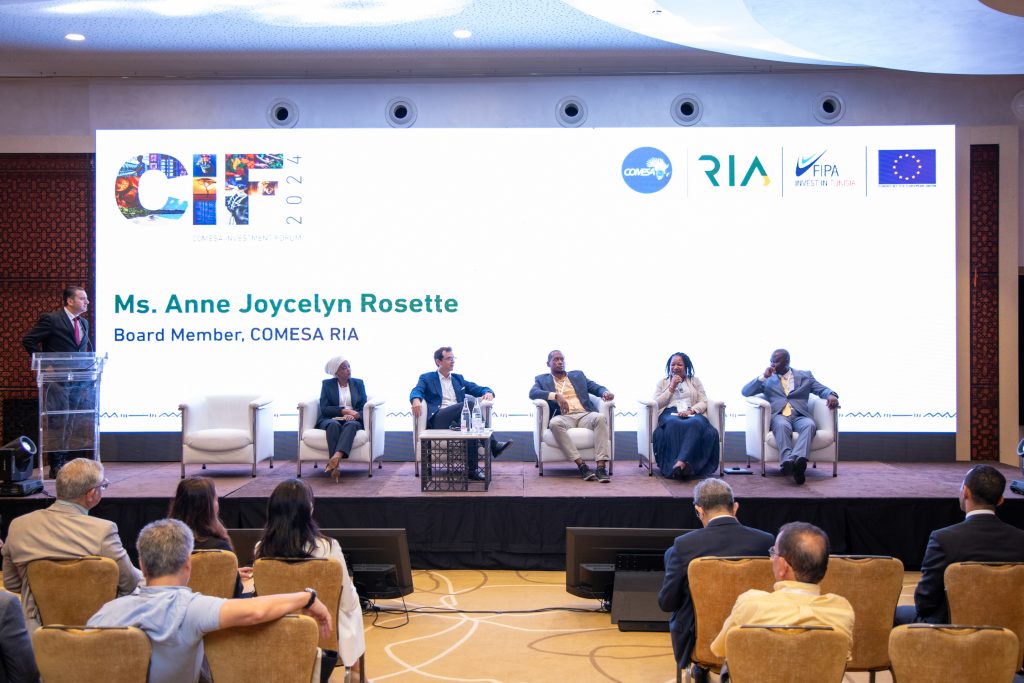
Two COMESA Institutions participated in the first-ever COMESA Investment Forum held in Tunis, Tunisia. The high-level event provided a good opportunity for the thriving institutions to share out information about the operations and engaged local and international stakeholders.
The Chief Executive Officers of the COMESA Clearing House (CCH) Ms. Jedidah Ndebele and COMESA Competition Commission Dr Willard Mwemba joined by COMESA RIA Board member Ms. Anne Joycelyn Rosette, AfricInvest Group Senior Partner and Group General Secretary Mr. Rafik Mzah and Continuum Managing Director Mr. Daniel Paul Kaggwa, participated on a panel discussion on ‘Financing and Facilitating COMESA Trade and Investment.
On COMESA Investments, COMESA Clearing House (CCH) CEO Ms. Jedidah Ndebele, stated that her institution facilitates the settlement of cross border trade and services among Member States through the Regional Payment and Settlement System – REPSS – which allows Member States to transfer funds more easily within COMESA. It presents home grown solutions to facilitating trade and investments in the COMESA region.
She added that REPSS is a multilateral netting system with end-of-day settlement in a single currency (US$ or Euro), with the system allowing for settlement in a multicurrency environment. The main aim of the system is to stimulate economic growth through an increase in intra-regional trade by enabling importers and exporters to pay and receive payment for goods and services through an efficient and cost-effective platform. Local banks access the payment system through their respective Central Banks. The CEO further stated that any participating bank is, therefore, able to make payments to, and receive payments from, any other participating bank. The linkages through Central Banks avoid the complex payment chains that may sometimes occur in correspondent bank arrangements. The system operates through member countries Central Banks and their corresponding banking systems, with the Central Bank of Mauritius operating as the settlement Bank.
Tunisia was invited to consider joining the Regional Payment and Settlement System to facilitate business transactions through an efficient and cost-effective platform that is governed by rules and regulations, is secure and transparent.
CCC CEO Dr Willard Mweemba stated that the role of the institution was to promote and encourage competition within COMESA by, preventing restrictive business practices that deter the efficient operation of markets thereby facilitating the regional integration. A key role of the CCC is to identify, prevent and prohibit anti-competitive practices including anti-competitive mergers and to protect consumers against offensive conduct by market players having operations.
In response to the issue of high notification fees for mergers, Dr Mweemba indicated that fees are dependent on existing processes at the national and regional levels including projected turnover and assets. He further stated that the Commission examines mergers that are long term in nature and have majority stakes as opposed to minority stakes, which are usually not notified. He provided practical examples on the role played by CCC in identifying and addressing restrictive business practices in the region that due to being monopolistic in nature, restricted or excluded other business players from operating freely in the marketplace and would have had a negative effect on economic development and disadvantaged consumer welfare.
In closing, the CCC CEO noted the need to ensure that there is a balance between investments and competition for a conducive business environment to be established. He stated that recent FDI trends show an increase in greenfield renewable energy projects, with a high turnover of USD 23.3 billion in mergers and acquisitions in 2023. The CCC is available to assist countries to promote and encourage fair competition in trade and investment projects.
COMESA RIA Board Member Ms. Anne Joycelyn Rosette, highlighted the benefits offered by RIA in facilitating trade and investments in the region which include capacity building for COMESA Member States National Investment Promotion Agencies (NIPAs). This is in identifying, packaging, and promoting investment opportunities, developing proactive aftercare programmes and work plans, FDI facilitation and inquiry handling best practices, marketing locations for FDI among other topics.
RIA also helps Member States in positioning COMESA positioning the region as an attractive investment destination by holding promotional activities including forums, conferences, experience sharing events targeting NIPAs.
Echoing views raised by the forum, the RIA Board Member reiterated the critical need to share information and data on issues related to trade and investments in the region.
The representative of AfricInvest Group Mr. Rafik Mzah provided a background of the corporation as an investment and financial services company which is positioned as one of the most experienced private equity investors on the continent. AfricInvest has dedicated investment teams focused on Africa and has experience in operating in the COMESA region in all sectors including agribusiness and services amongst others. Mr. Rafik Mzah noted that national companies that participate in COMESA through investment ventures become regionally oriented owing to the large size of the COMESA market which presents immense opportunities in various sectors. He noted the following challenges that affect financing and facilitating trade and investments:
And Mr Daniel Paul Kaggwa of the Continuum Group located in Kampala, Uganda, noted that return on investment is higher in Africa at 11.4% compared to 7.1% in Asia. He stated that the growth potential of the African market is 2nd to Asia which shows huge growth potential at 4.9%. The Continuum Group Managing Director further stated the need to streamline policies for investment opportunities at the continental and regional level to facilitate trade and investments. He further stated that long term FDI stimulates local investments over time and sustain regional economic development. Challenges which negatively affect FDI include political uncertainty, corruption, low skilled labour force and variable geometry amongst others.

